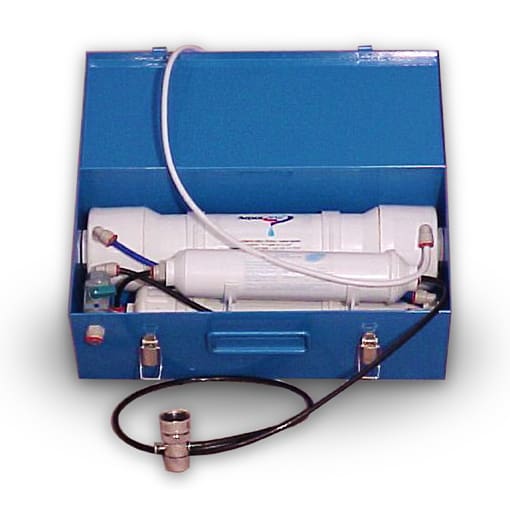Water Purification Systems
only the best quality systems for you
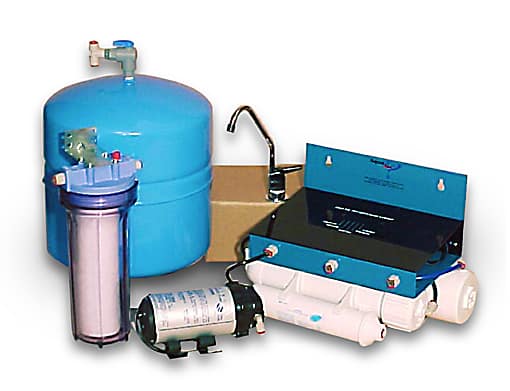
GOLD 500
The Gold 500 System is fully automatic, making it easy to use and requiring minimal maintenance.
The automatic membrane flushing system increases the lifespan of the reverse osmosis membrane, saving you money on replacements.
The micro-processor controlled Electronic Display Panel is the most modern available, providing advanced features not found in other water purification systems.
The illuminated Light Emitting Diodes give self-diagnostic status of the water purification process in the system, giving you peace of mind that your water is being properly filtered.
The Gold 500 System uses reverse osmosis technology to remove impurities, ensuring that you have clean, safe drinking water.
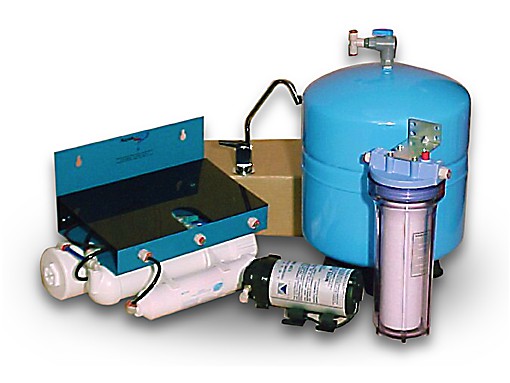
GOLD 400
The Gold 400 System is fully automatic, making it easy to use and requiring minimal maintenance.
The manual membrane flushing system increases the lifespan of the reverse osmosis membrane, saving you money on replacements.
This system uses an electrical pressure sensor switch to sense when the tank is full, and will switch the system off when tank pressure reaches a pre-set level, ensuring that the tank doesn't overflow.
The Gold 400 System uses reverse osmosis technology to remove impurities, ensuring that you have clean, safe drinking water.
The system is compact and can be easily installed under your sink, saving space in your home or office.
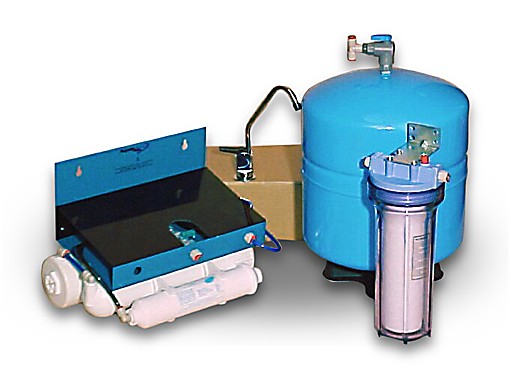
GOLD 100
The Gold 100 System is fully automatic, making it easy to use and requiring minimal maintenance.
The manual membrane flushing system increases the lifespan of the reverse osmosis membrane, saving you money on replacements.
This system uses a hydraulic differential pressure sensor, which allows the system to operate at lower mains pressures than the Gold 400 and Gold 500 systems, making it more versatile.
If adequate water pressure is available, this system can operate without electricity, reducing your energy consumption and costs.
The Gold 100 System uses reverse osmosis technology to remove impurities, ensuring that you have clean, safe drinking water.
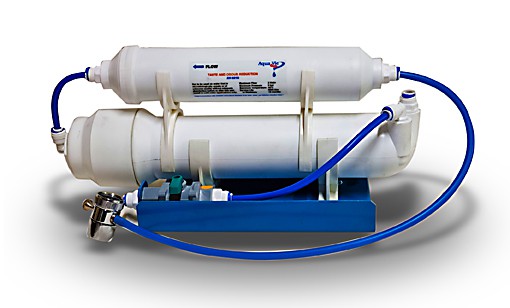
GOLD 50
The Gold 50 is an ideal entry-level water purification system for small households, individuals, flats, and frequent travelers.
Its compact and lightweight design makes it easy to install and transport, requiring minimal space on a countertop.
The manual operation process offers more control over the purification process, enabling customized water quality to meet specific needs.
The manual membrane flushing system increases the reverse osmosis membrane lifespan, saving costs on replacements.
The Gold 50 can produce up to 120 liters of purified water per day, without a Deionization module, maintaining a smaller size and weight while providing high-quality water filtration.
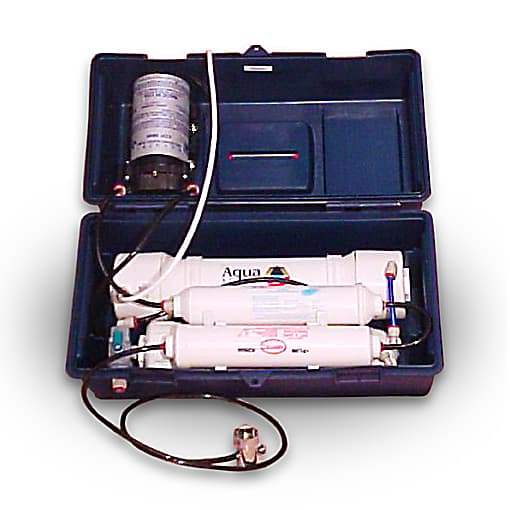
PORTABLE
The Gold Portable System is designed for portable use in rural areas where there is normally very low mains water pressure, making it a great option for those who live or work in remote areas.
A pressure booster pump is included as standard, ensuring that the system can operate effectively even in areas with low water pressure.
The system is fitted with a high flow membrane to increase the rate of production of purified water, allowing for faster water filtration.
The operation of the system is manual, which may be preferred by those who want more control over the process, this also makes the system last longercess.
The Gold Portable System can produce up to 120 liters of purified water per day, providing plenty of water for rural households or workers.
| Power Required | Yes |
| Operation | Fully Automatic |
| Owner Management | None |
| Minimum Pressure (psi) | 55 |
| Maximum Pressure (psi) | 125 |
| Production (liter per day) | 180 |
| Service Interval (months) | 9 |
| Sediment Tolerance | Good |
| Pressure Boost Pump | Yes |
| Tank Full Sensing | Pressure Switch 30 psi |
| Store Tank Pressure (psi) | 30 |
| Water on Tap (17l tank) | Up to 10 |
| Power Required | Yes |
| Operation | Automatic, Manual Flush |
| Owner Management | Manual Flush Weekly |
| Minimum Pressure (psi) | 55 |
| Maximum Pressure (psi) | 125 |
| Production (liter per day) | 180 |
| Service Interval (months) | 9 |
| Sediment Tolerance | Good |
| Pressure Boost Pump | Yes |
| Tank Full Sensing | Pressure Switch 30 psi |
| Store Tank Pressure (psi) | 30 |
| Water on Tap (17l tank) | Up to 10 |
| Power Required | No |
| Operation | Automatic, Manual Flush |
| Owner Management | Manual Flush Weekly |
| Minimum Pressure (psi) | 50 |
| Maximum Pressure (psi) | 90 |
| Production (liter per day) | 180 |
| Service Interval (months) | 9 |
| Sediment Tolerance | Good |
| Pressure Boost Pump | Yes |
| Tank Full Sensing | 60% of Line Pressure |
| Store Tank Pressure (psi) | 60-70% of Line Pressure |
| Water on Tap (17l tank) | Depends on Line pressure |
| Power Required | No |
| Operation | Manual |
| Owner Management | Manual Flush Weekly |
| Minimum Pressure (psi) | 30 |
| Maximum Pressure (psi) | 125 |
| Production (liter per day) | 180 |
| Service Interval (months) | 9 |
| Sediment Tolerance | Low |
| Pressure Boost Pump | Yes |
| Tank Full Sensing | – |
| Store Tank Pressure (psi) | – |
| Water on Tap (17l tank) | – |
| Power Required | Yes |
| Operation | Manual |
| Owner Management | Manual Flush Weekly |
| Minimum Pressure (psi) | 0 |
| Maximum Pressure (psi) | 125 |
| Production (liter per day) | 270 |
| Service Interval (months) | 9 |
| Sediment Tolerance | Low |
| Pressure Boost Pump | Fitted |
| Tank Full Sensing | – |
| Store Tank Pressure (psi) | – |
| Water on Tap (17l tank) | – |
| Power Required | Yes |
| Operation | Manual |
| Owner Management | Manual Flush Weekly |
| Minimum Pressure (psi) | 30 |
| Maximum Pressure (psi) | 125 |
| Production (liter per day) | 180 |
| Service Interval (months) | 9 |
| Sediment Tolerance | Low |
| Pressure Boost Pump | Yes |
| Tank Full Sensing | – |
| Store Tank Pressure (psi) | – |
| Water on Tap (17l tank) | – |
| Power Required |
| Operation |
| Owner Management |
| Minimum Pressure (psi) |
| Maximum Pressure (psi) |
| Production (liter per day) |
| Service Interval (months) |
| Sediment Tolerance |
| Pressure Boost Pump |
| Tank Full Sensing |
| Store Tank Pressure (psi) |
| Water on Tap (17L tank) |
| Yes | Yes | No |
| Fully Automatic | Automatic, Manual Flush | Automatic, Manual Flush |
| None | Manual Flush Weekly | Manual Flush Weekly |
| 55 | 55 | 50 |
| 125 | 125 | 90 |
| 180 | 180 | 180 |
| 9 | 9 | 9 |
| Good | Good | Good |
| Yes | Yes | Yes |
| Pressure Switch 30 psi | Pressure Switch 30 psi | 60% of Line Pressure |
| 30 | 30 | 60-70% of Line Pressure |
| Up to 10 | Up to 10 | Depends on Line pressure |
| Yes | Yes | No |
| Fully Automatic | Automatic, Manual Flush | Automatic, Manual Flush |
| None | Manual Flush Weekly | Manual Flush Weekly |
| 55 | 55 | 50 |
| 125 | 125 | 90 |
| 180 | 180 | 180 |
| 9 | 9 | 9 |
| Good | Good | Good |
| Yes | Yes | Yes |
| Pressure Switch 30 psi | Pressure Switch 30 psi | 60% of Line Pressure |
| 30 | 30 | 60-70% of Line Pressure |
| Up to 10 | Up to 10 | Depends on Line pressure |
| Yes | Yes | No |
| Fully Automatic | Automatic, Manual Flush | Automatic, Manual Flush |
| None | Manual Flush Weekly | Manual Flush Weekly |
| 55 | 55 | 50 |
| 125 | 125 | 90 |
| 180 | 180 | 180 |
| 9 | 9 | 9 |
| Good | Good | Good |
| Yes | Yes | Yes |
| Pressure Switch 30 psi | Pressure Switch 30 psi | 60% of Line Pressure |
| 30 | 30 | 60-70% of Line Pressure |
| Up to 10 | Up to 10 | Depends on Line pressure |
| No | Yes | Yes |
| Manual | Manual | Manual |
| Manual Flush Weekly | Manual Flush Weekly | Manual Flush Weekly |
| 30 | 0 | 30 |
| 125 | 125 | 125 |
| 180 | 270 | 180 |
| 9 | 9 | 9 |
| Low | Low | Low |
| Yes | Fitted | Yes |
| – | – | – |
| – | – | – |
| – | – | – |
| No | Yes | Yes |
| Manual | Manual | Manual |
| Manual Flush Weekly | Manual Flush Weekly | Manual Flush Weekly |
| 30 | 0 | 30 |
| 125 | 125 | 125 |
| 180 | 270 | 180 |
| 9 | 9 | 9 |
| Low | Low | Low |
| Yes | Fitted | Yes |
| – | – | – |
| – | – | – |
| – | – | – |
| No | Yes | Yes |
| Manual | Manual | Manual |
| Manual Flush Weekly | Manual Flush Weekly | Manual Flush Weekly |
| 30 | 0 | 30 |
| 125 | 125 | 125 |
| 180 | 270 | 180 |
| 9 | 9 | 9 |
| Low | Low | Low |
| Yes | Fitted | Yes |
| – | – | – |
| – | – | – |
| – | – | – |
INSTRUCTIONS
How It Works
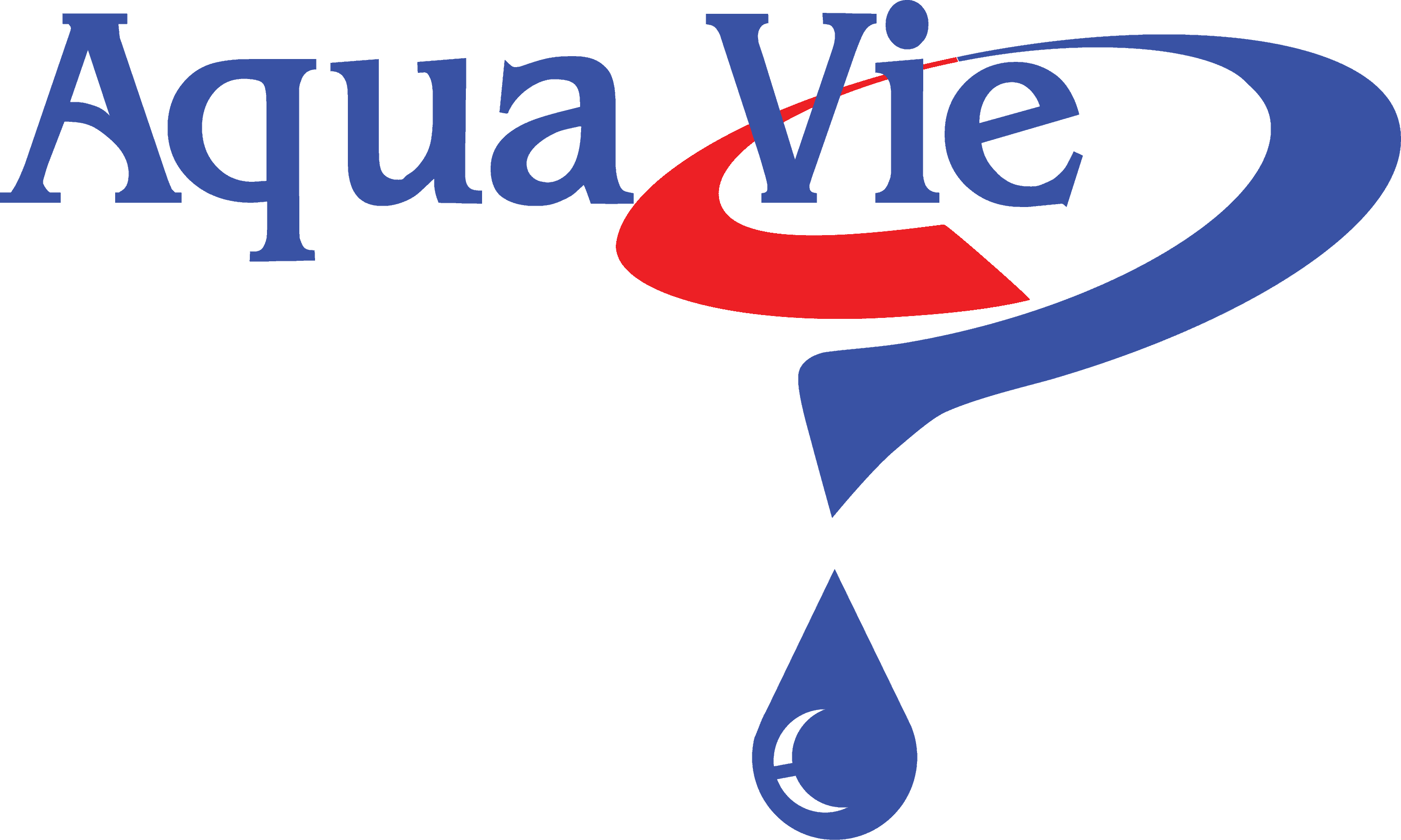
An RO system is more than a filter; it’s a valuable water appliance that adds convenience and value to your home. Use RO water for coffee, tea, juice, soup, veggies, ice, and baby formula. It’s also perfect for watering plants, filling aquariums, and connecting to your ice maker and refrigerator.
Say goodbye to expensive bottled water costs, as an RO system pays for itself in no time. Don’t worry about low TDS levels; RO systems effectively improve water quality, ensuring customer satisfaction. Upgrade to RO and enjoy a healthier, more convenient life at home.
Total Dissolved Solids (TDS)
The quality of RO product water depends on the TDS level in the feed water, as RO membranes reject a percentage of the feed TDS. TDS also affects the minimum feed pressure required, and for every 100 ppm of TDS, 1 psi must be deducted from the source pressure.
It is crucial to know the maximum allowable concentrations of dissolved solids for different pH levels to ensure the proper operation of an RO system. The higher the pH of the water, the less tolerant the membrane is to chemicals and minerals, which can deposit on the surface of the membrane and lead to its failure.
Water Pressure
The pressure in the RO process refers to the differential pressure across the membrane, affected by feed pressure, back pressure, and osmotic pressure due to TDS. Every 100 ppm of TDS decreases the feed pressure by 1 psi, requiring a higher feedwater pressure for higher TDS levels. The minimum net pressure for thin film TFC POU membranes is 20 psi, and doubling or halving the net pressure affects the production rate proportionally. The percentage rejection of TDS also decreases as the net pressure falls below the minimum net pressure.
Water Temperature
Feedwater temperature also determines RO production rate because of the effect it has on the viscosity of water. The industry standard for determining the production rate is 25EC. As a rule of thumb, RO production falls to approximately half with a drop in temperature of about 20EC. The water temperature must be known to ensure that the maximum operating temperature is not exceeded, or membrane degradation will occur over time.
Maximum operating temperatures for cellulose acetate (CA) and cellulose triacetate (CTA) membranes is 29EC and 38EC for TFC membranes. Membranes should never be allowed to freeze as they will instantly become damaged beyond repair. Water temperature is measured with a standard thermometer after allowing the source to flow for at least one minute.
Water Disinfection
To ensure the safety of your feedwater, check if it contains disinfectants like chlorine, chloramines, iodine, or ozone. You can do this by contacting your municipality or by using a free- and total-chlorine test kit. Even if you don’t see a residual disinfectant at your installation site, your water may still be disinfected at a central source on a regular schedule.
Thin-Film Composite (TFC) membranes are vulnerable to oxidants, so it’s best to use deoxidising filters like carbon filters before standard TFC membranes. These filters can also remove sediment and prevent “blinding” of the membrane. Chloramines have little effect on TFC membranes, but there’s usually some free chlorine in water supplies disinfected with chloramines.
Water PH
pH measures how acidic or basic a substance is. The scale goes from 0 to 14, with 7 being neutral. Lower values indicate more acidity, while higher values indicate more alkalinity. Acidity is the ability of water to neutralize bases, while alkalinity is the ability of water to neutralize acids.
Water pH affects the rejection of dissolved solids like arsenic and the presence of minerals like iron, manganese, and hardness, which can cause scaling. The pH is measured using a calibrated pH meter on-site.
Impurities
Impurities in feedwater can have a significant impact on the effectiveness and longevity of point-of-use (POU) membrane systems. Without proper analysis, impurities such as hardness, iron, manganese, and even algae can foul or scale the membrane, leading to decreased performance and increased maintenance costs.
A reliable water analysis is essential for identifying potential impurities in the feedwater and taking appropriate measures to prevent membrane fouling and scaling. By regularly monitoring and treating impurities in feedwater, POU membrane systems can continue to deliver high-quality water without interruption.
Testimonials
Happy Customers
“I’m really impressed with the quality of water it produces, well done Aqua Vie. My new water tap tastes clean and refreshing, and I feel better knowing that my family is drinking safe, purified water. The installation process was easy and the customer service team was helpful in answering my questions. Overall, I’m very satisfied with my experience with Aqua Vie and would definitely recommend their products to others.”
“I have been using Aqua Vie’s water purification system for a few months now, and I am amazed by the noticeable improvement in the quality of my drinking water. The system is easy to use and maintain, and I appreciate the company’s commitment to sustainability. Overall, I am happy with my investment in Aqua Vie and would recommend it to anyone looking for a reliable water purification solution.”
“I am thrilled with the results. The water tastes clean and refreshing, and I feel more confident about the safety and purity of my drinking water. The installation process was quick and easy, and the customer service team was helpful and knowledgeable. I appreciate the company’s commitment to sustainability and the environment. I recommend this company to anyone looking for high-quality water filtration system.

